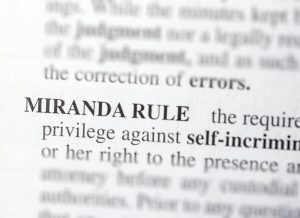Everybody has heard of Miranda rights, but few actually understand what they are and what they do. You may be surprised to learn that police officers do not always have to read you your Miranda rights when they are questioning or even arresting you? Sounds crazy, but it’s true.
The name “Miranda” came from the landmark United States Supreme Court case Miranda v. Arizona in 1966. The issue was whether police officers had to advise a person of his or her Constitutional rights before questioning them about a crime. What constitutional rights? The Fifth Amendment to the Constitution provides the constitutional right against self-incrimination. In other words, the government can’t make you tell them anything that may incriminate you. And the person must be told that he or she has the right to consult with an attorney to discuss the Fifth Amendment right. So, out of the Miranda case, came the Miranda rights or warnings that we all have become accustomed to when someone is arrested.

But Miranda rights only relate to custodial interrogation and the right against self incrimination. So, if you don’t incriminate yourself, no Miranda rights are required. And law enforcement must only advise you of your Miranda rights before interrogating you in a custodial setting. Whether a person is in custody depends on what a reasonable person in the person’s place would believe that they were in custody. So if officers don’t interrogate you or it’s not in a custodial setting, then they don’t have to read you your rights.
 Jacksonville Criminal Lawyer Blog
Jacksonville Criminal Lawyer Blog


 Every person charged with a crime in the United States is entitled to a speedy trial. This is a federal constitutional right guaranteed by the
Every person charged with a crime in the United States is entitled to a speedy trial. This is a federal constitutional right guaranteed by the 